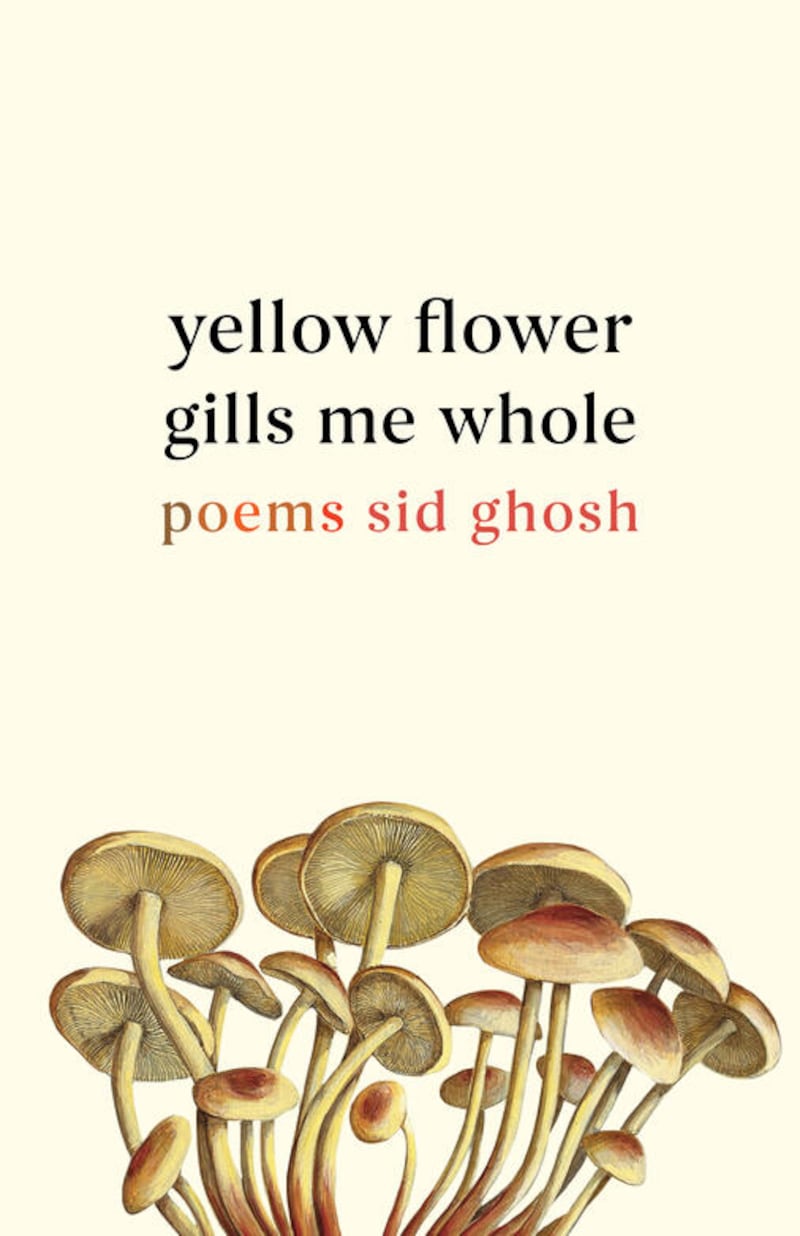Before anything else is said about him, know this: Sid Ghosh’s poetry goes toe to toe with some of contemporary poetry’s strongest writers.
His first full-length poetry collection, Yellow Flower Gills Me Whole (Milkweed Editions,120 pages, $18), came out in August after Ghosh previously released two chapbooks. The nearly 100 poems Ghosh chose are short enough to breeze past superficially in under an hour, yet his book is no speed read. The book’s title references the cosmic, the supernatural and the mundane with an immediately intriguing perspective. When readers give Ghosh’s ponderings the time they deserve, Yellow Flower could be an all-day read with time well spent.
Ghosh is 18 years old, but his biography notes that he’s going on 81. His writing voice makes this more than clear. His vocabulary, line breaks, and sentence structure are striking for a writer of any age. During an appearance on the podcast The Lucky Few, the Portland-area poet was asked how he knew when Yellow Flower Gills Me Whole was complete. Ghosh repeated his poem “Every Poem Is a Bell” as his answer: “I know/when/the pressure/gradient/has equalized.” Though his line breaks are plentiful and his word count scarce, Ghosh accomplishes more as a writer with fewer words than the pros near either end of his age range.
Yellow Flower Gills Me Whole exhibits a perspective that seems to sit outside of time. At times, Ghosh’s poems shift between humorous, profound, risqué and sensual. Others suggest a profound loneness—not loneliness or craving companionship, but awareness of a one-of-one nature.

Hats, for example, have nearly as many mentions as God. Ghosh tells WW that to him, “Hats are like masks we wear and roles we play.” Yellow, another recurring theme, “is the color of strangeness, fevers, flowers and rivers.” His use of God neither advocates nor criticizes a religion’s take on holiness, but seeks understanding of an unknowable almighty power, and the chasm between what we think we know and what we will never know.
“God has created/kindred fractals,” Ghosh writes in “Images.” “Man has made/kindred police.” Meanwhile, in “Moxie,” he takes on a similarly haunted philosophy: “To an infinite/host/you are still/a ghost.” As with “Life,” Ghosh conveys how grief knocks the bereaved out of time from others’ realities: “Leaf falls/I am here./Ghosts of trees/brothers in loss/I am here./Life moves on/living through others/I am here.”
But Yellow Flower Gills Me Whole—which takes its name as half of the poem “Be Mum”—isn’t just heady thoughts on the afterlife. Some of Ghosh’s poems are whimsical, like “Marigold and Marijuana,” which describes being a bee in the world’s flower garden. Others show a flair for dry laugh-out-loud humor, like the three-word poem with its Fiona Apple-proportioned title “By the River One Died and the Other Survived” (we don’t want to spoil too many of Ghosh’s poems, but he gets props as a comedy writer).
A few of Ghosh’s poems stuck out for their tactile responses. “On Teenage” seems to capture the hypersexual way teens turning into adults see the world during puberty, conveying seemingly an age-appropriate fascination with and simultaneous revulsion toward sex (not to mention a timeless disdain for other guys—Ghosh’s use of Romeo here recalls recent portrayals of Shakespeare’s loverboy as a himbo like the Broadway musical & Juliet). His poem “No Thanks” is so succinctly sassy and punchy that anyone with boy problems would steal it from this review for their next Instagram breakup announcement.
Ghosh is an autistic, nonspeaking writer with Down syndrome who uses Rapid Prompting Method, a form of spelled communication. He points to letters on an RPM board read and processed by his mother, Dr. Vaish Sarathy, a chemist, educator and autism advocate. Ghosh says over email that no one is required to read or recite his poems using RPM. “I am not too fond of limiting my work to the spelling community,” he says. “I intend for every enthusiast of poetry to read it.”
One of Ghosh’s strongest poems simply declares who he is in one line. “I belong to the unchiseled,” he writes in “NerD.”
Another is an entire proverb, a conversation between two flowers that offers hope to readers in trying times. “Again the lotus/reminds the rose/‘Remain above the mud,’” reads the first half of “Game of Thorns.” The second half?
“Again the rose/reminds the lotus/‘I have thorns.’”

